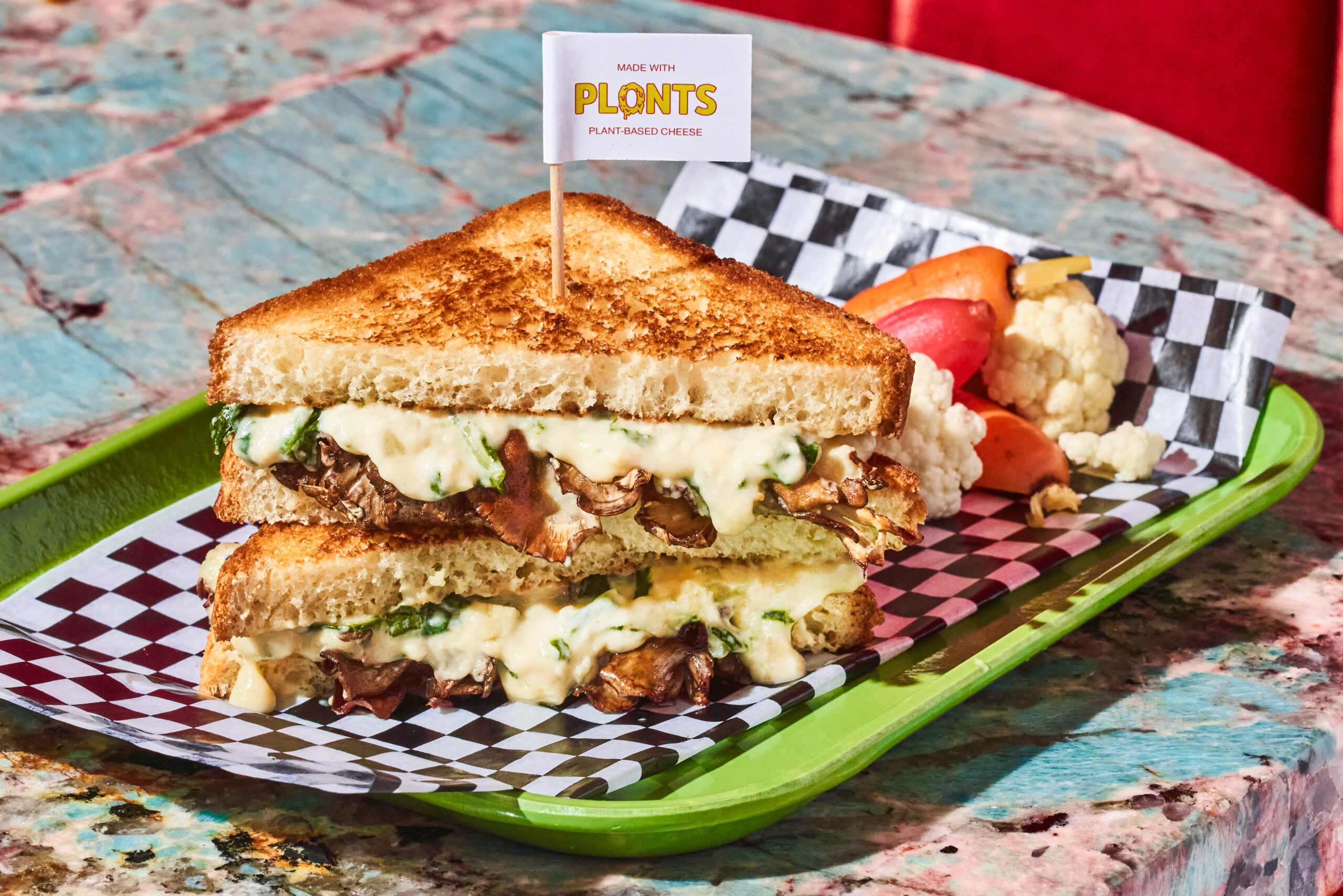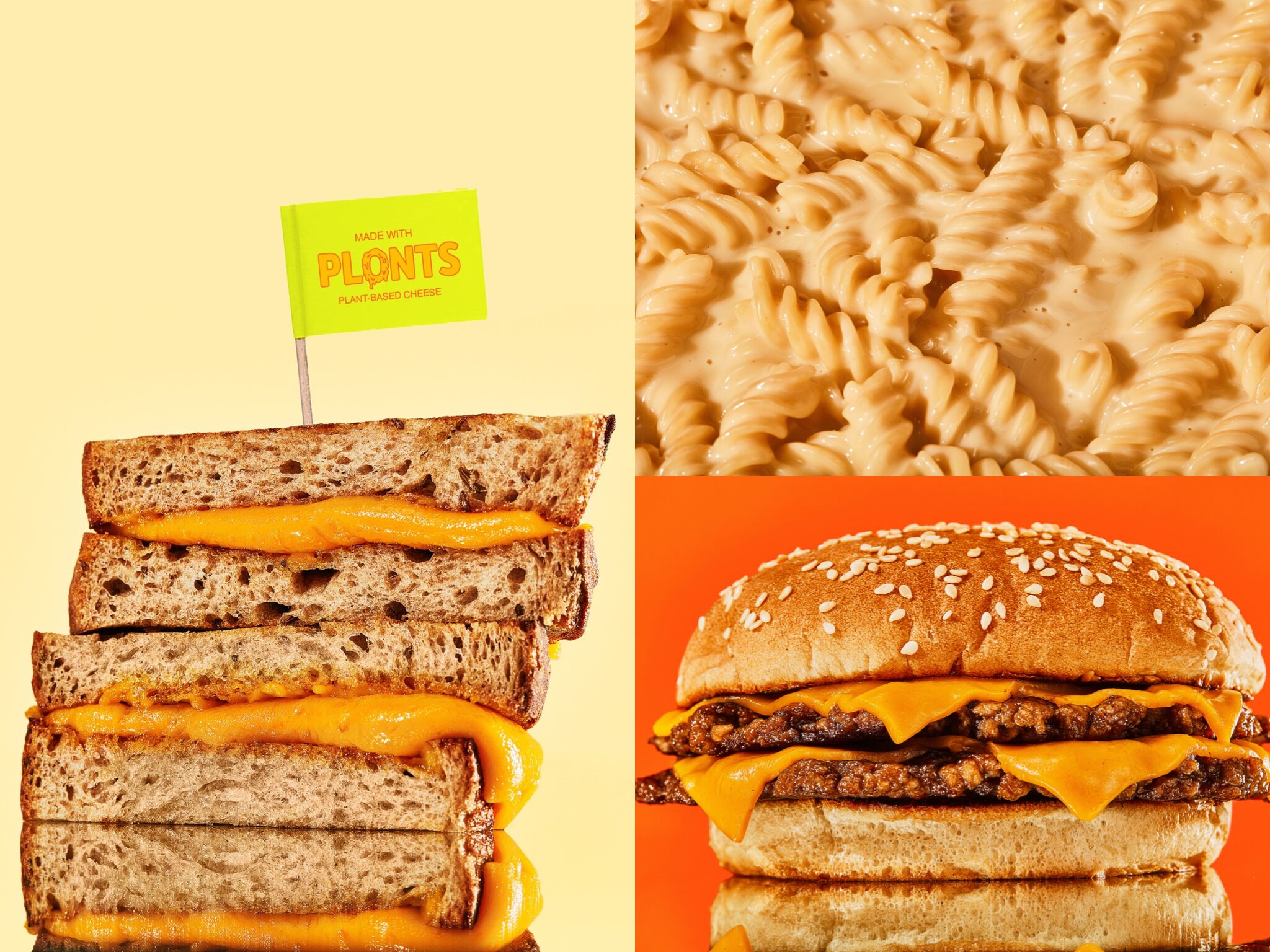This Stinks! Fermented Vegan Cheese Maker Plonts Stretches Budget with $12M Seed Investment
6 Mins Read
Californian startup Plonts has emerged from stealth with a $12M funding round, launching its fermented soy milk cheese at restaurants in New York City and San Francisco.
Cheese is not a dairy product; it is a microbial product – and Plonts wants you to know that.
Formerly known as Tezza Foods, the Oakland-based startup uses microbial fermentation to turn soy milk into “stinky” vegan cheese. Armed with a $12M seed investment round, it is introducing its first product – an aged Cheddar – at select bicoastal restaurants in the US.
The financing was led by Lowercarbon Capital, with participation from Litani Ventures, Accelr8, Pillar, Ponderosa Ventures, and several angel investors. It was accompanied by the opening of a pilot plant in Oakland.
The company was founded in 2019 by co-CEOs Nathaniel Chu, who has a PhD in the gut microbiome, and Josh Moser, whose background lies in venture capital. Chu tapped into his microbial expertise to create fermented foods from plants, and began experimenting with vegan cheese in the corner of a pizza restaurant.
Now, the Plonts Cheddar – currently sold in loafs to restaurants – is coming to the menus of Court Street Grocers and S&P Lunch in New York City, Shuggie’s and Moongate Lounge in San Francisco, and Lovely’s in Oakland, appearing in grilled cheeses, pizza puffs and burgers.
“We’ve used our seed financing to continue our research efforts, grow our team, build a pilot facility, and launch our first product into restaurants,” Chu tells Green Queen.
Touching upon the pilot plant, Moser adds: “It’s a 10,000 ft facility, about half of which is dedicated to production. This is where we’ll produce our cheese for the foreseeable future, and we plan to grow meaningfully in this space in the coming years.”

All about efficiency
Plonts’ ‘microbes, not dairy’ mantra for cheese is rooted in the fact that it uses traditional cheesemaking processes, but eschews cow’s milk with soybeans, one of the most efficient protein sources with a digestibility score equal to animal proteins. “We use a specially developed blend of cultures and enzymes to create tangy, cheesy flavours as the cheese ages. The result is a bold cheddar that slices, shreds, and melts,” says Chu.
It is far from the only company using centuries-old processes in a novel way to make climate-friendly cheese – Miyoko’s Creamery is a pioneer in this space (it uses cashews), Daiya recently began doing the same with oats, and Climax Foods and Stockeld Dreamery are up-and-comers championing pumpkin seeds, hemp protein and lima beans, and pea milk, respectively.
But Plonts is betting on soybeans. Chu explains that soybeans are “one of the most nutritious, sustainable, and affordable sources of plant protein on the planet”, giving its cheese 3g of protein per slice, and a firmer, creamier bite.
Then there’s the sustainability aspect. Soy, along with corn, is a commodity crop, and is a major driver of deforestation in the Amazon. However, globally, 77% of all soy is grown to feed cattle being raised for meat and dairy.
“It can take eight pounds of corn and soy to make one gallon of milk, and… 10 pounds of corn and soy blend to make one pound of beef,” Mark Shepard, founder and farmer at New Forest Farm, said in the 2024 documentary Feeding Tomorrow. “And so that’s really stupid. Because we could grow 90% less corn and beans if we didn’t feed it to animals.”
Echoing this sentiment, Chu says: “It’s also more resource efficient to grow a pound of soybeans than to grow many pounds of soybeans, feed them to a cow, and get a pound of beef or cheese. That’s why dairy milk production requires 22 times more water, 13 times more land, and creates three times more greenhouse gases than soy milk.”

A Cheddar that takes less Chedda’
Just like fermentation originally transformed “cheap but not particularly tasty ingredients like milk and wheat into delicacies like cheese and beer”, the startup is making use of “the most sustainable, inexpensive plants available” and introducing them to microbes that make them more delicious.
“Our searches may result in familiar foods from unfamiliar ingredients (e.g., cheese made from cheap plants) or entirely new categories of fermented products. In this way, we’re not trying to imitate beef and dairy. We are discovering the delicious potential of what plants and microbes can be,” says Plonts.
Cheese, one of the most famous fermented foods, is known for its funky, sharp flavours, which the startup ascribes to the metabolism of microbes, instead of milk. Some companies – like Perfect Day, Formo and New Culture, to name a few – are using precision fermentation to recreate bioidentical dairy proteins for more realistic animal-free cheese.
But this is expensive, and scaling up is a major challenge. Soy, on the other hand, is cheap and easy to scale, and Plonts looks to take advantage of that by “biochemically and physically manipulating” the ingredient to replicate the stretch and melt so important to many cheeses.

Plonts aims to undercut dairy costs
Plonts is entering a crowded category with multifaceted challenges. Between 2021 and 2023, only four plant-based segments witnessed sales declines in the US – vegan cheese was one of them, dipping by 5.4%. Plant-based cheese has only penetrated 7% of American homes, with less than half (49%) buying it more than once.
How does Plonts – whose name has already spawned some detractors – aim to differentiate itself from the growing number of brands selling vegan cheese? “We’re approaching plant-based cheese in a fundamentally different way. We’re creating the complexity of flavour that can only come from creating an aged product and using cost-competitive, high-protein ingredients,” says Moser.
“We believe we do stand out on taste, texture, and health,” he adds, highlighting consumers’ main complaint about vegan cheese: how it feels in the mouth. “Our specially developed blend of cultures and enzymes combined with cost-competitive and high-protein ingredients gives our cheese flavour complexity and nutrition.”
Moser believes Plonts’ cheese will become cheaper than commodity dairy cheese in the long term. “Milk is the largest part of dairy cheese’s cost structure. We can make milk much cheaper,” he explains.
“This makes sense for a simple reason: eating plants is cheaper than feeding those same plants to cows and then eating the cow or its milk. The heart of our discovery platform is finding microbes that transform nutritious, sustainable, and inexpensive ingredients into something actually fun to eat.”
By harnessing microbes, the company claims it can lower costs to less than half of dairy cheese, “something that cannot be said for cheese made with nuts or engineered proteins”, it says on its website.
It may seem like a bit of a stretch, but that’s the idea.



